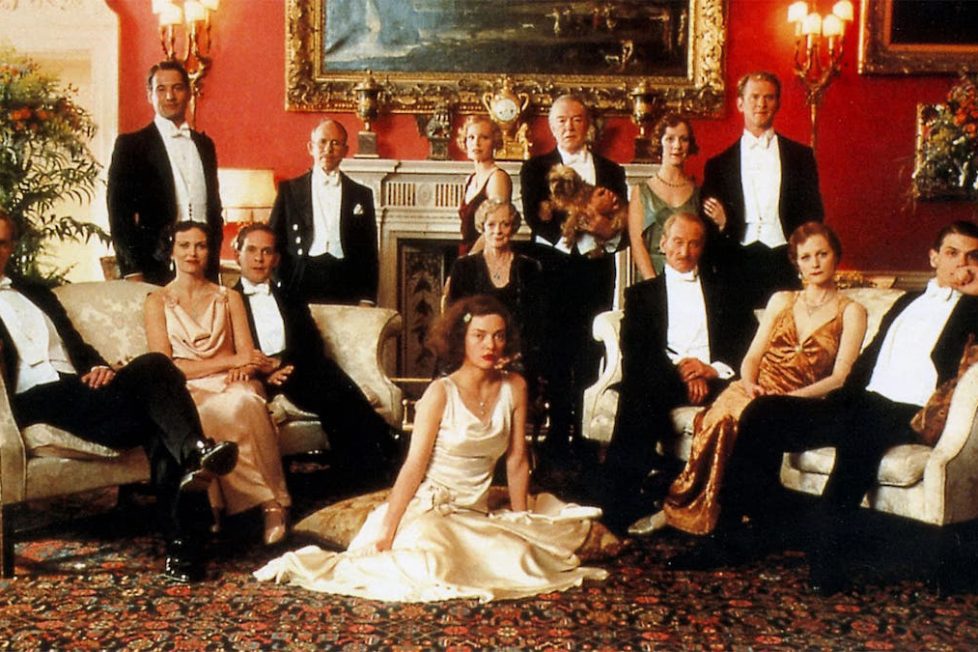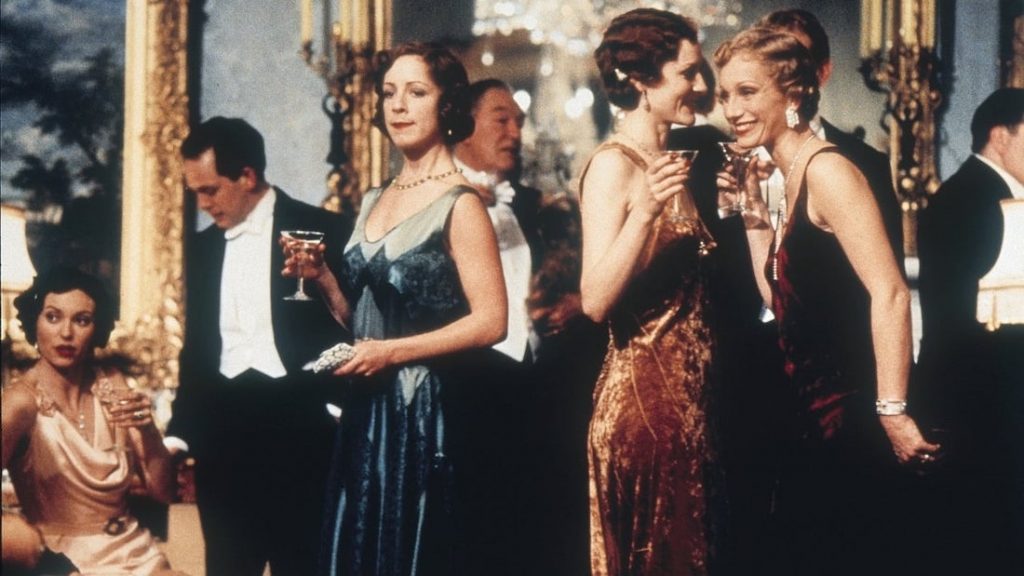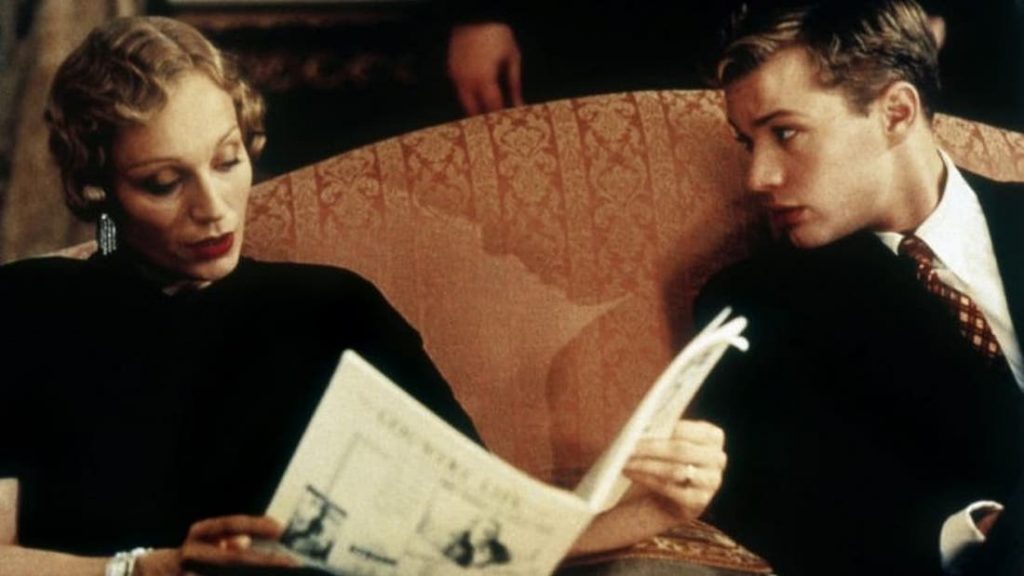GOSFORD PARK (2001)
When a murder is committed at an English country house in the 1930s, there’s no shortage of suspects above or below stairs

When a murder is committed at an English country house in the 1930s, there’s no shortage of suspects above or below stairs


The butler did it. Maybe. Almost everyone in Robert Altman’s Gosford Park is a conceivable suspect in the killing of Sir William McCordle (Michael Gambon) in the library of his country house in 1932. And inevitably, in a film which gleefully parodies the Agatha Christie school of crime story while making its own razor-sharp commentary on class and exploitation, the line “the butler did it” is actually spoken by a character.
However, screenwriter Julian Fellowes (who later created Downton Abbey, originally conceived as a Gosford Park spin-off) rightly described the movie as a “who-cares-whodunnit” and the killing of Sir William—indeed the whole plot—is only an excuse to portray characters and the way they live.
Unlike the traditional country-house murder mystery, however, Gosford Park is at least as much concerned with the servants below stairs as with the toffs above. And one of these—Mary (Kelly Macdonald), lady’s maid to the supremely haughty Countess of Trentham (Maggie Smith)—is as close as this ensemble movie comes to having a single protagonist.

Mary and her mistress are among the guests who arrive for a shooting weekend at Gosford Park; their hosts being the ill-fated and boorish Sir William and his bored wife Lady Sylvia (Kristin Scott Thomas). Wrotham Park in Hertfordshire was used for exteriors of the house, Syon House in London and sound-stage sets for interiors.
Other guests include Anthony (Tom Hollander), nervously seeking Sir William’s investment in a business project you just know is doomed to failure; Lord Stockbridge (Charles Dance); songwriter and film star Ivor Novello (Jeremy Northam); an American film producer Morris Weissman (played by Bob Balaban, who produced Gosford Park and was instrumental in developing the original idea). He’s visiting to research a Charlie Chan detective movie set in an English country house…
They also bring their servants with them, and so the house’s regular complement—like the housekeeper (Helen Mirren), the first footman (Richard E. Grant), and Sir William’s valet (Derek Jacobi)—are joined by newcomers, including Mary, the American Weissman’s own valet (Ryan Phillippe), and Lord Stockbridge’s (Clive Owen).

What ensues over 143 tightly written and interwoven scenes is both very funny and very perceptive, with the large cast, complex plot, and numerous deceptions all characteristic of Altman. The humour at its broadest can be physical or double entendre—Carry On Remains of the Day?—but more often it’s slyer. Some of it’s at the expense of the English (the film opens with the sound of rain and a shot of a puddle; Maggie Smith’s impossibly snooty countess doesn’t know, or pretends not to know, the word “okay”). Some of it is at the expense of Americans (Weissmann’s a vegetarian, provoking incomprehension in the kitchen, and obsessed with the telephone, still something of a newfangled gadget at this time; his valet, meanwhile, seems to have difficulty grasping just how significant class differences are in Europe).
Some of the humour is simply absurd (“can a pheasant ever be dangerous?” asks Weissmann, with goodness knows what image in mind). Some is self-referential—for example, a character confesses to not understanding the difference between a film producer and a director, and the police inspector played by Stephen Fry is never able to finish pronouncing his own name before he’s interrupted, likely an in-joke referring to Altman’s penchant for overlapping dialogue.
At the same time, though, there’s acute social observations, particularly of the differences and connections between the servants and those they serve. The staff are ever-present—indeed, there’s hardly a scene without at least one of them, and to a large extent the film takes their collective point of view. The upper classes depend on them, not just for practical assistance but for information, and sometimes are keener to make friends with their servants than the servants are to reciprocate. Others, most notably the monstrous Sir William, are abusive.

Yet the below-stairs team are far from passive recipients of exploitation. They have their own jealously-guarded hierarchy, and they can be just as cynical and self-serving as their employers, though they can also be just as starstruck by Novello. Their resentment at discovering late in Gosford Park that one character was in fact an employer masquerading as a manservant rings very true.
These parallels and contrasts between the two large groups of servants and masters are at the heart of Gosford Park, but it touches also on many other aspects of English upper-class life in the 1930s, for example the antisemitism still common in polite society (Lord Stockbridge is visibly taken aback when he first hears the name Weissmann), and the peculiar in-between position of the police, who belong neither with the gentry nor with the servants.
Fellowes’s screenplay, which won Gosford Park its only Academy Award (though Altman, Mirren and the movie itself were also nominated), is a beautifully-wrought piece of clockwork, manipulating around 30 significant characters through countless entrances, exits, telling glances and blatant clues (bottles of poison, kitchen knives, blood-like tomato juice). Only Rupert (Laurence Fox) and Jeremy (Trent Ford), two young men who join the party to pursue their own self-interested agenda, are a bit superfluous; every other character makes a contribution.
And almost every one of them is superbly portrayed by actors who get few big scenes alone and mostly have to convey their characters through brief lines or small interactions. Among the standouts are Gambon’s Sir William, believably nasty and domineering; Northam’s super-smooth Novello, very aware that as an entertainer he is a kind of servant himself, even if he has been notionally admitted to the ranks of the served; the perpetually anxious Hollander; and Fry’s bumbling police inspector, who keeps on overlooking clues his constable (Ron Webster) points out. Smith, meanwhile, has a terrific series of politely cutting lines and a wonderful air of entitled self-pity (there’s “nothing more exhausting”, she says, than “breaking in a new maid”).
Below stairs, there’s Phillippe’s sexually ambiguous and available young valet (a role first occupied by Jude Law, who dropped out); the taciturn Owen and surly, sarcastic Grant as two very different servants; and, in what turns out to be one of the film’s most important roles, Mirren’s housekeeper. “I’m the perfect servant,” she says, “I have no life”—and accordingly she underplays right to the very end, where the simplicity of her performance gives real weight to the final big revelations.
These are not at all unforeseeable, it has to be admitted, but just as “who-cares-whodunnit”, that doesn’t matter. Gosford Park isn’t a film that engages and delights with what happens; its magic lies in how it happens and who to. Individual scenes like a painfully awkward dinner following an embarrassing revelation are often very well done, and there is some clever technique (for example the way that a scene of men shooting effectively brings home the distance between them on the ground and the birds in the sky).
But it’s not these that stick in the mind long after the film is over: it’s the people. Gentry or hired help, they are all recognisably human, exaggerated just enough to be droll, flawed enough to be plausible but (at least in most cases) not enough to be dreadful—and alike in striving to achieve their desires within a class system which, it becomes clear, constrains the upper even more than the lower.
US • UK | 2001 | 137 MINUTES | 2.35:1 | COLOUR | ENGLISH
director: Robert Altman.
writer: Julian Fellowes.
starring: Maggie Smith, Michael Gambon, Kristin Scott Thomas, Charles Dance, Tom Hollander, Jeremy Northam, Ryan Phillippe, Stephen Fry, Clive Owen, Helen Mirren, Emily Watson, Alan Bates, Derek Jacobi & Richard E. Grant.
